Original | Odaily Planet Daily (@OdailyChina)
Author | Ethan (@ethanzhangweb3)_
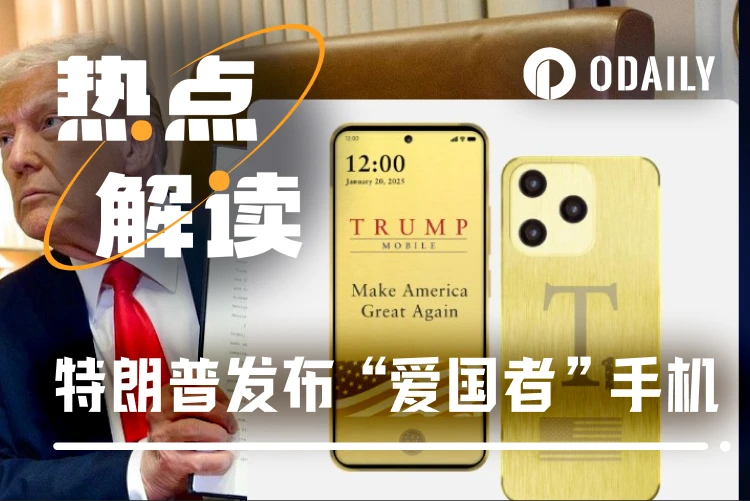
On June 16, 2025, U.S. President Trump officially announced the launch of his mobile communication brand Trump Mobile, simultaneously unveiling its first smartphone, the T1, along with the accompanying “The 47 Plan” communication package. In the announcement, Trump boldly declared, “Trump Mobile will use ‘Made in America’ phones and services,” emphasizing that the package will provide services such as roadside assistance and unlimited texting. The introduction of the T1 phone has sparked significant public discourse.
In fact, this is not Trump's first foray into product sales. Previously, he opened a “Trump Store” on Amazon, selling items such as red baseball caps, T-shirts, and mugs, achieving impressive sales, leading netizens to humorously remark that his “main business is selling goods, and his side job is being president.” The launch of the smartphone seems more like a new site in his “traffic monetization” business system.
The release of the T1 phone coincides with the tenth anniversary of Trump's first presidential campaign announcement, making its political symbolism evident. This is not just a product launch but also a self-coronation ceremony for the “brand president.”
Product Overview and “Patriotic Sentiment” Marketing
T1 Phone: “The American Version of 8848”?
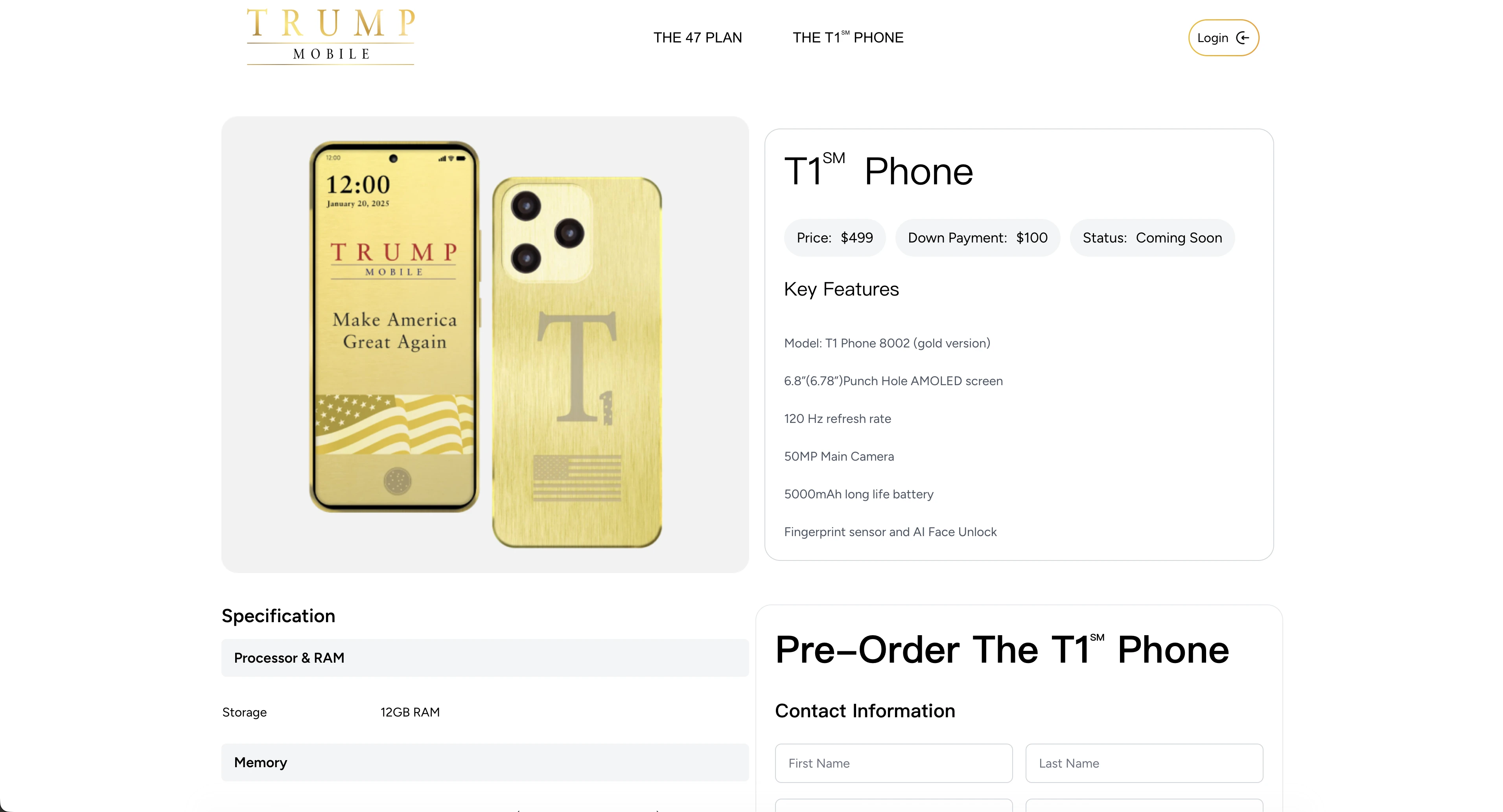
Trump Mobile official website: https://www.trumpmobile.com/t1-phone
The T1 phone is priced at $499 (approximately 3580 RMB), expected to be launched in September 2025. The device features a metal brushed texture body, with the American flag engraved on the back, and Trump's campaign slogan “Make America Great Again” embedded on the screen.
In terms of specifications, the T1 features a 6.8-inch AMOLED punch-hole display, a 120Hz refresh rate, a 5000mAh battery, 12GB+256GB storage, and runs on Android 15, while notably retaining a 3.5mm headphone jack. Overall, its hardware specifications are at a mid-to-high level.
Upon closer inspection of its appearance, some netizens pointed out that the T1 bears a striking resemblance to the iPhone 14 Pro series in terms of camera layout, with the three-camera module arranged identically, leading to it being humorously dubbed the “political version of 8848,” implying “luxurious appearance but mediocre core.”
“The 47 Plan”: A Political Metaphor for the Communication Package
Trump Mobile also launched a communication package named “The 47 Plan,” with a monthly fee of $47.45, focusing on unlimited calls, texts, and high-speed data, along with additional services such as international calls, roadside assistance, and telemedicine. The name of the phone service “The 47 Plan” and the monthly price of $47.45 both allude to Trump: he was the 45th president and is currently the 47th.
This kind of “digitally symbolic politics” naming method has been frequently seen in Trump-related merchandise (such as hats and sneakers) and is a hallmark strategy of his personal brand narrative.
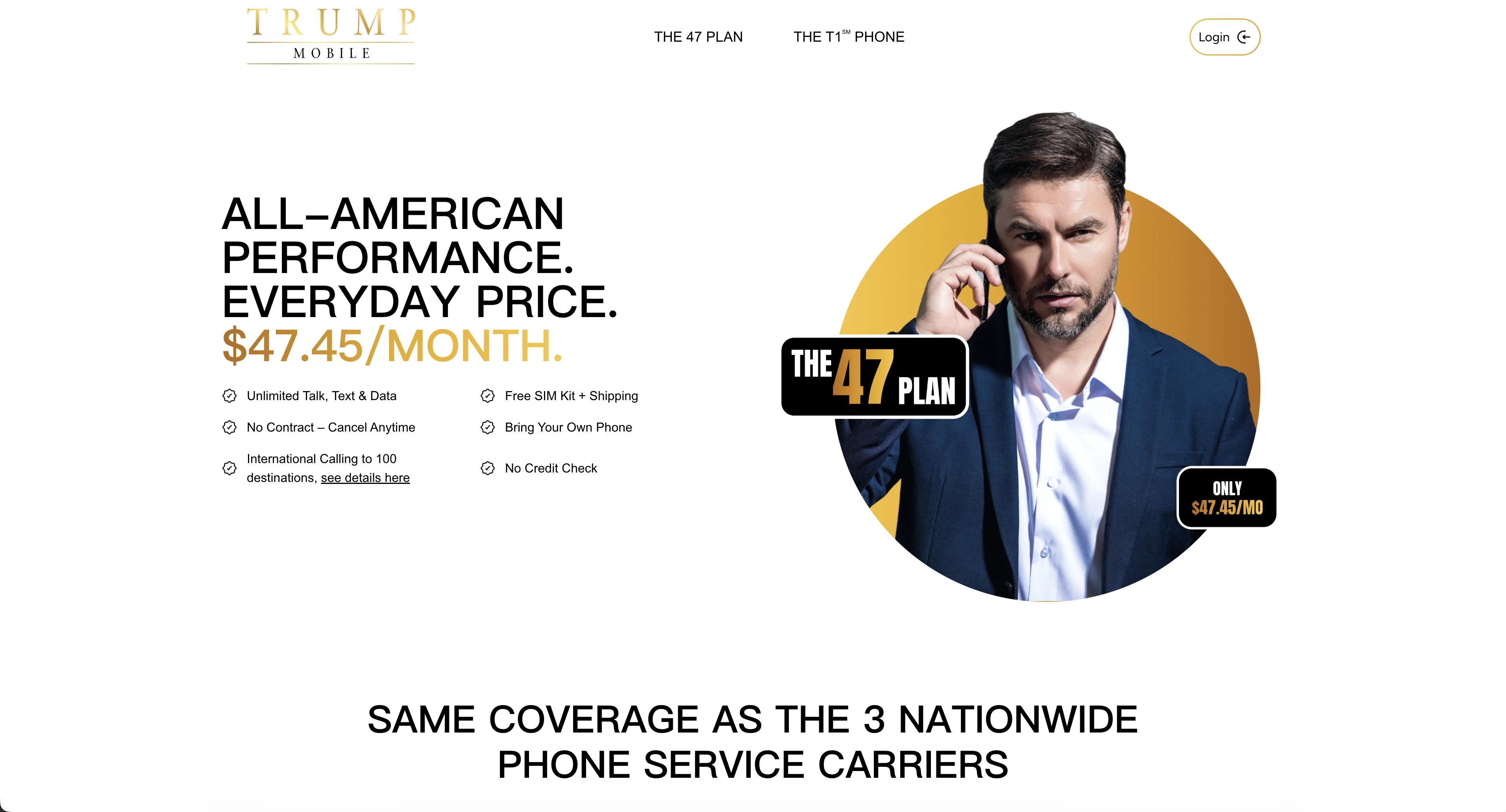
Trump Mobile official website: https://www.trumpmobile.com/
Who Will Foot the Bill?
The core users of Trump Mobile are aimed at middle-aged and elderly conservative voters, veterans, and their families, representing a loyal base of the conservative camp. They generally value the symbolic meaning of “Made in America,” conservative values, and a focus on national security. This group has a high level of identification with Trump and is a typical “emotion-driven brand” consumer group.
It is foreseeable that Trump Mobile will subsequently launch more accessories with “loyalist branding,” such as watches, headphones, T-shirts, or “presidential certification” limited packaging, forming a “brand merchandise matrix” that leverages political identity for continuous monetization.
Controversy Focus: The Truth of “Made in America” and the Cost-Performance Dilemma
Does “Made in America” Hold Up?
Despite Trump and his son repeatedly emphasizing that the T1 is “designed and manufactured in the United States,” it quickly faced multiple doubts. Apple Insider analyst Max Weinbach pointed out that the T1 is actually very similar to T-Mobile's REVVL 7 Pro, which is produced by the Chinese ODM manufacturer Wingtech, with production possibly located in Jiaxing, Wuxi, or Kunming.
Johns Hopkins University Carey Business School professor Daiting Long noted that most components used in the T1 cannot be manufactured in the U.S., and the country currently lacks the capability to establish a complete smartphone industry chain. He stated, “To manufacture such products in the U.S. may require more than five years of infrastructure development.”
Additionally, according to the Federal Trade Commission (FTC) regulations on “Made in USA,” products must be “entirely or substantially” assembled and manufactured in the U.S., which the T1 clearly fails to meet.
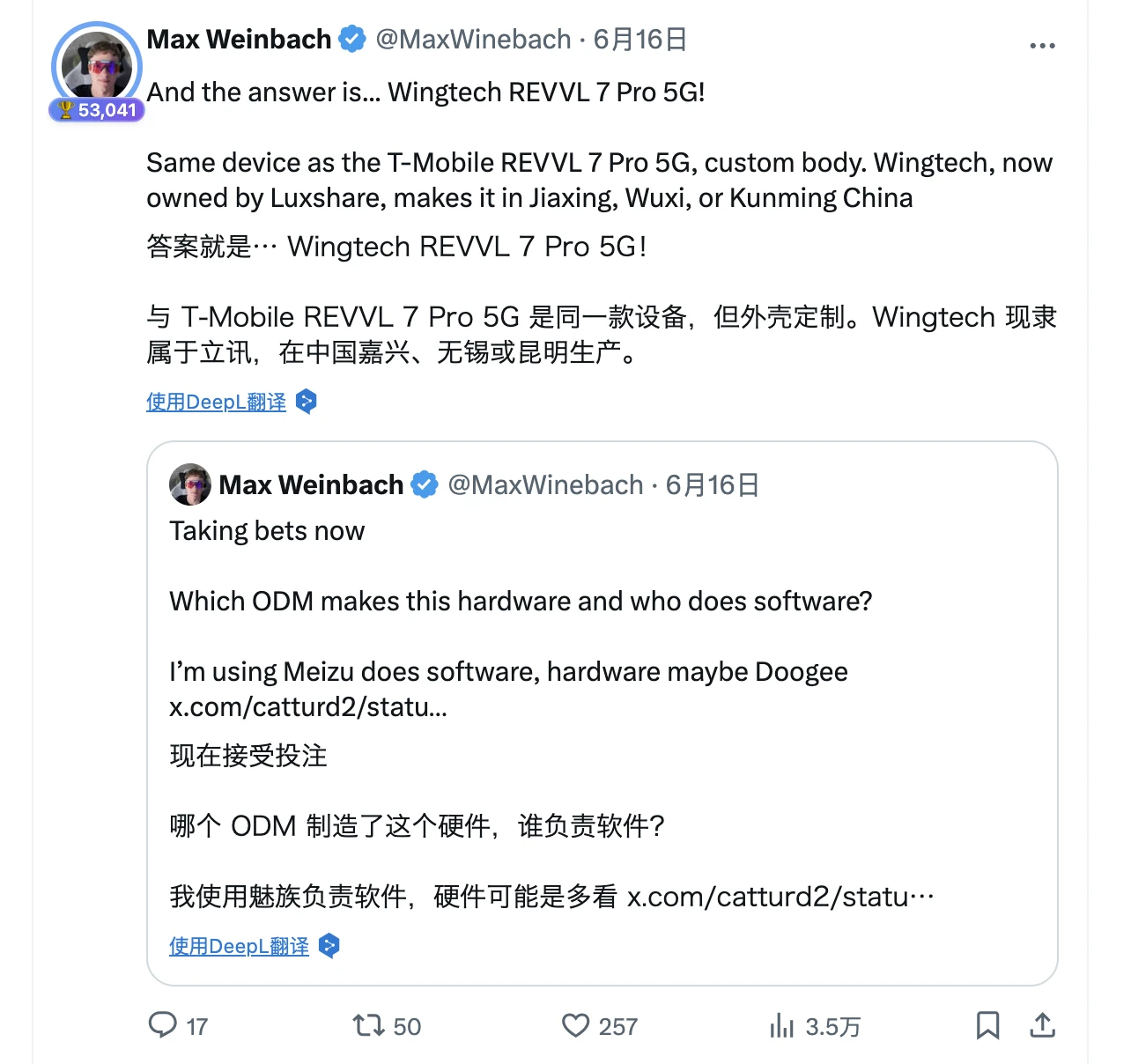
Is the Brand Premium Justified?
The T1 is priced at $499, which is generally over $150 more than other Android phones with similar specifications on the market (such as the Pixel 7a and Moto Edge). More critically, its value-added services can mostly be provided by market MVNOs (virtual network operators) at lower prices.
This premium is clearly not for performance but for brand, belief, and identity recognition. From a “cost-performance” perspective, this strategy is not reasonable; however, from a “tribal consumption” logic, its pricing may actually strengthen brand loyalty. This positioning is reminiscent of Apple's early “Think Different” differentiation strategy, which offers a reference point.
Where is the Boundary Between Politics and Business?
Trump is currently both the sitting U.S. president and the symbolic owner of Trump Mobile, with his family business continuously using his political identity in promoting the phone, sparking widespread discussion about the “blurred lines between politics and business.”
In 2024, his personal income reached $600 million, sourced from various channels including golf courses, brand licensing, and cryptocurrency. D.A. Davidson analyst Gil Luria believes that the launch of Trump Mobile is another typical case of “using political capital for commercial monetization,” as the company previously launched a series of consumer-facing commercial products, starting with the social media platform Truth, followed by cryptocurrencies promoting the president and his wife.
NBC commented that Trump Mobile is becoming the latest link in Trump’s “family business machine,” continuing his model of converting political influence into retail profitability. In this narrative of “the president as a brand,” the boundaries between public roles and private interests are increasingly blurred.
Deeper Business Logic: Web3 Economic Experiment and “Traffic Gold Rush”
Trump's phone is not just a simple communication terminal; it may be a precursor to a larger “Web3 + political economy” experiment. Crypto investor Mark Cuban stated on X platform that Trump Mobile may come pre-installed with a crypto wallet supporting TRUMP Meme coins, stablecoin USD1, and family-related projects WLFI. He speculated, “This phone could earn fees through wallet transactions and preload any content they want to sell.”
This “hardware as a wallet” and “phone as an entry point” strategy is key to the Solana Saga phone's comeback: Saga initially had a high price and poor sales, but with the inclusion of airdropped BONK tokens, users received value far exceeding the phone itself, leading to a rapid sellout. If Trump Mobile replicates this model, launching similar rewards mechanisms like “buy a phone and get MAGA coins” or “airdrop DJT stocks,” its phone will no longer just be a terminal but will become an “identity token” and “entry pass.”
In this mechanism, consumers are transformed into participants, investors, and even evangelists, evolving from “presidential fans” to “economic stakeholders,” forming a self-driven, viral traffic structure.
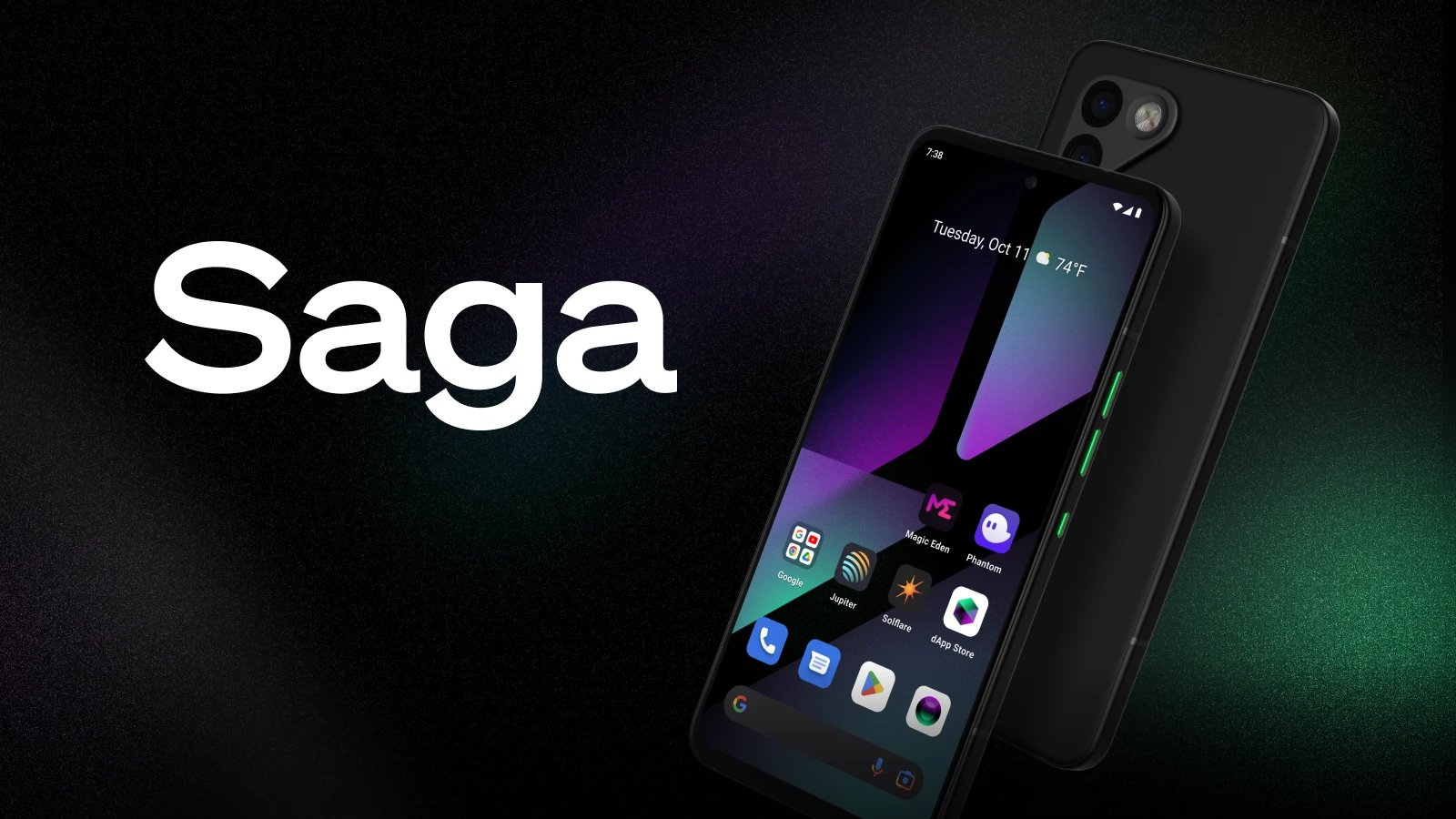
Conclusion: A Political Tool or a Market Newcomer?
The birth of Trump Mobile is the latest practice of Trump commercializing the “traffic-brand-asset” pathway.
If it remains at the level of “private label phone + conservative audience,” it may struggle to escape the fate of being a “flash in the pan.”
However, if it continues to advance its integration with the Web3 economic model, promoting DJT stock airdrops and launching MAGA coins and other equity assets, Trump Mobile is likely to build a “closed economic ecosystem” that integrates politics, business, finance, and community.
In this process, the phone becomes a “mobile identity tag,” political views become assets, votes transform into tokens, and consumers are integrated into a new narrative system of the Trump brand.
This will certainly not be a substitute for the iPhone but a spokesperson for a value system. How Trump Mobile develops will depend on whether it truly makes that “golden call to the new world.”
Related Reading
Monetizing Presidential Privilege: How the Trump Family Harvests the Crypto Market with TRUMP Tokens
免责声明:本文章仅代表作者个人观点,不代表本平台的立场和观点。本文章仅供信息分享,不构成对任何人的任何投资建议。用户与作者之间的任何争议,与本平台无关。如网页中刊载的文章或图片涉及侵权,请提供相关的权利证明和身份证明发送邮件到support@aicoin.com,本平台相关工作人员将会进行核查。




